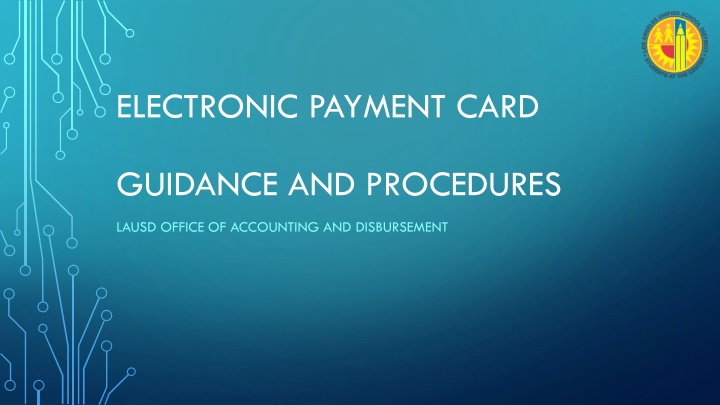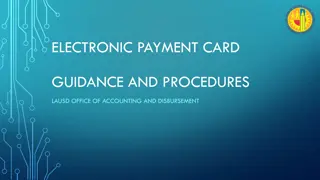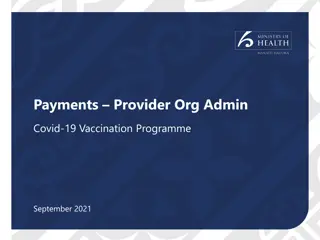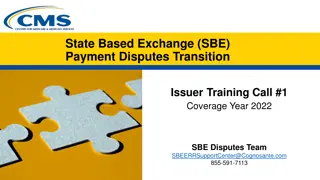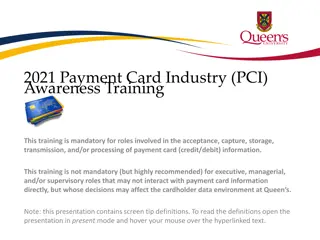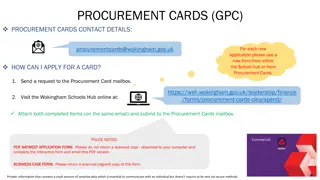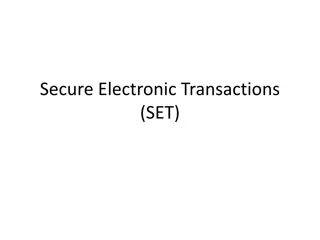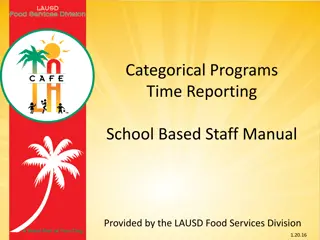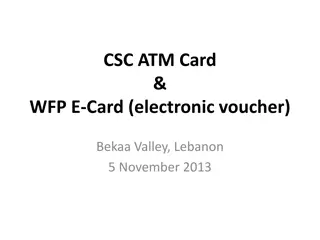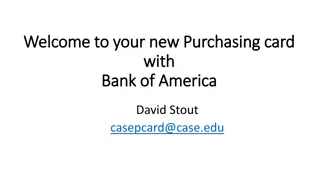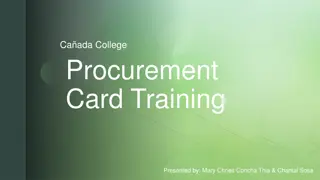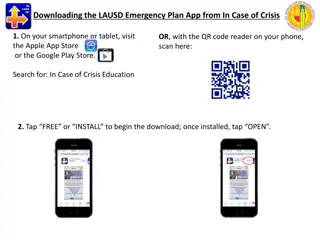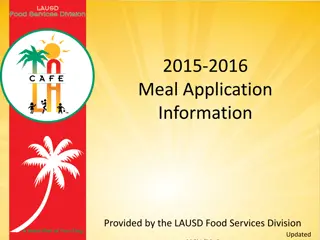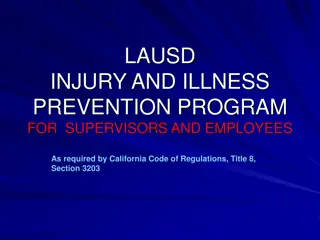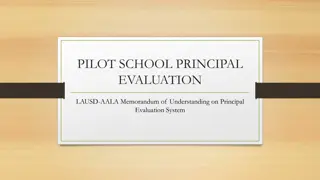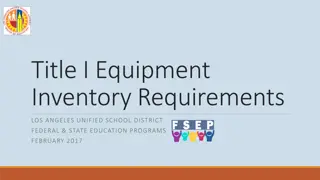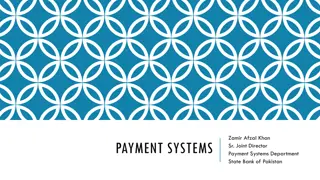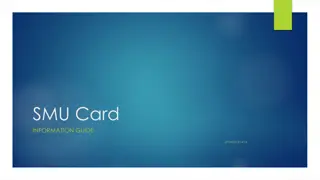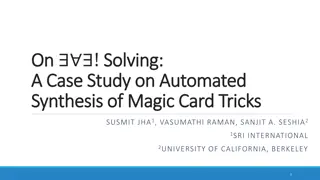LAUSD Electronic Payment Card Guidance and Procedures
LAUSD Office of Accounting and Disbursement provides detailed guidance and procedures for electronic payment card services, including establishing services, acceptance procedures, terminal operation, reports, and more. Merchants within LAUSD are guided on how to handle electronic transactions securely and efficiently. The document emphasizes the importance of compliance with Payment Card Industry Data Security Standards (PCI DSS) and outlines the responsibilities of merchants in safeguarding card information and preventing fraud.
Download Presentation

Please find below an Image/Link to download the presentation.
The content on the website is provided AS IS for your information and personal use only. It may not be sold, licensed, or shared on other websites without obtaining consent from the author.If you encounter any issues during the download, it is possible that the publisher has removed the file from their server.
You are allowed to download the files provided on this website for personal or commercial use, subject to the condition that they are used lawfully. All files are the property of their respective owners.
The content on the website is provided AS IS for your information and personal use only. It may not be sold, licensed, or shared on other websites without obtaining consent from the author.
E N D
Presentation Transcript
ELECTRONIC PAYMENT CARD GUIDANCE AND PROCEDURES LAUSD OFFICE OF ACCOUNTING AND DISBURSEMENT
TABLE OF CONTENTS Introduction Establishing Payment Card Services Payment Card Acceptance Procedures Payment Card Terminal Operation Payment Card Reports Paper-Based Transactions Equipment Storage and Maintenance Contact Information
INTRODUCTION LAUSD collects fees, accepts payments, and transacts tens of millions of dollars of goods and services annually. These transactions are processed through several different mechanisms that include traditional cash and checks, payment card terminals, point-of-sale systems, and web-based payment card processing.
INTRODUCTION Accounting and Disbursement is the administrator for electronic card transaction processing that is accepted for the sale of goods and services by all entities within LAUSD. The role of Accounting and Disbursement is to: Assist merchants with establishing payment card processing capabilities by outlining a standard method, policies & procedures, and guidelines for a merchant to obtain a merchant ID through JP Morgan Chase or other payment processing options. Authorize merchants for payment card processing. Provide training to merchants for payment card processing and data security. Assist the merchant with obtaining the payment terminal equipment and setup for payment card processing with JP Morgan Chase. Oversee Payment Card Industry Data Security Standard (PCI DSS) compliance of the payment card processing merchants. Conduct periodic reviews of the merchant s payment card processing environment to ensure that all policies and procedures are being followed.
INTRODUCTION Who is an LAUSD merchant? A merchant is a unit or department that receives monetary payment for goods, services, information, or gifts. Only authorized cash collection units may request to become an electronic payment card processing merchant. We will use the term merchant to refer to LAUSD units or departments who handle monetary transactions. Some examples of merchants are: Departments accepting card payments for goods, services, registration, or events School student stores Testing and assessment centers Merchants who need assistance with electronic payment card payment processing should contact Accounting and Disbursement at accountinganddisbursement@lausd.net
INTRODUCTION Merchant s Responsibilities include, but are not limited to: Take all steps to secure card information and prevent fraud. Follow best practices for payment card acceptance. Settle all transactions daily, at end of business day. Respond to all card dispute notifications within two business days. Follow up with customer transaction inquiries promptly to avoid chargebacks. Notify Accounting and Disbursement if cancelling payment card acceptance service and to coordinate return of card processing equipment. Communicate and report any issues to Accounting and Disbursement regarding payment processes, extraordinary circumstances, or fraud.
INTRODUCTION Merchant s responsibilities (cont d): Comply with all electronic payment policies and procedures. Cooperate with periodic reviews conducted by Accounting and Disbursement of the merchant s payment card processing environment. Ensure completion of Accounting and Disbursement training and adherence to guidelines. Note: Please remember that all matters related to electronic payment processing is subject to formal review and audits.
INTRODUCTION Resources: The Electronic Payment and Payment Card Industry (PCI) Compliance Policy is the detailed policy bulletin for LAUSD payment cards. Additionally, please refer to the following information: Bulletin for Use of Credit Card and eWallet Vendors: ref 113301 Information Protection Policy: BUL-1077.2
ESTABLISHING PAYMENT CARD SERVICES The available methods of technology, which are the preferred method for payment card processing, are as follows: Point of Service Terminal (POS) E-Commerce-web-based payment card processing Electronic payment may occur at purchase (the card is present) or the payment card is NOT present at time of purchase. Merchants may accept the following payment cards. Visa MasterCard American Express (AMEX) Discover PIN-Based Debit cards presented at payment card terminal or POS system
ESTABLISHING PAYMENT CARD SERVICES Requirements for establishing electronic payment card processing If the requestor is an authorized cash collection unit, visit the Accounting and Disbursement website, complete the request form to become a payment card processing merchant. Prior to approval, you will be instructed to complete the PCI training on MyPLN and asked to follow the procedures for handling electronic transactions as outlined in this presentation.
ESTABLISHING PAYMENT CARD SERVICES Requirements for establishing electronic payment card processing Written approval from Accounting and Disbursement must be issued before entering into any contract or purchase of software and/or equipment for processing of payment card transactions with providers. This requirement applies regardless of the transaction technology used (e.g., e-commerce, outsourced to a third- party vendor, or payment terminals). A merchant s processing identity (merchant ID) is obtained from JP Morgan Chase as part of the setup process. If a merchant desires to set up their own relationships for payment card processing, the merchant is still expected to follow these guidelines for payment card handling. If a merchant desires to set up online payment integration (clickable button on a website), they must contact Accounting and Disbursement to initiate this setup: AccountingandDisbursement@lausd.net Please Note: If a merchant chooses to utilize a third-party electronic payment service provider (ie., Venmo, Square, PayPal, etc.), equipment and network connectivity must follow LAUSD guidelines established by LAUSD Network Security Devices transmitting financial data and transactions will not be connected to the LAUSD network.
ESTABLISHING PAYMENT CARD SERVICES Requirements for establishing electronic payment card processing Each merchant is required to designate the roles of Fiscal Officer and Dispute Resolution Contact as part of the approval process for payment card processing. The Fiscal Officer is responsible for: establishing or updating unit payment card processing services and administering new users. Implementing, supervising, enforcing and ensuring compliance with all payment card processing policies and procedures - must sign off on the unit's compliance measures. the oversight of the daily payment card processing operations. implementing and supervising the enforcement of all payment card processing policies and requirements. The Dispute Resolution Contact is responsible for: responding to requests with the required information for disputed transaction(s) within 2 days.
ESTABLISHING PAYMENT CARD SERVICES Accounting and Disbursement will contact the unit once the card acceptance service is approved and established. This communication will occur: After the bank merchant identity (ID) is determined. When the terminal equipment is available and ready for set up. After the requestor has completed PCI training on MyPLN. ALL personnel involved with card processing must complete Accounting and Disbursement Training.
ESTABLISHING PAYMENT CARD SERVICES For online payment card acceptance, the merchant submits the completed enrollment request form. The merchant will review the following information: Accounting and Disbursement Policies and Procedures presentation PCI training found on the MyPLN website: PCI Security Awareness
ESTABLISHING PAYMENT CARD SERVICES For online payment card acceptance (integrating payment functionality into a website), contact Accounting and Disbursement to facilitate ITD involvement with implementing the JP Morgan Chase Orbital Gateway into their department website. The JP Morgan Orbital Gateway: is an online connection that ties a merchant s systems to the backend processing systems of the bank processor. receives and sends encrypted transactions between the merchant and the bank processor. supports merchant and cardholder authentication, resulting in the safe transmission of payment data, and the authorization and processing of electronic payment transactions.
ESTABLISHING PAYMENT CARD SERVICES Any third-party software POS system must be a Data Secured System and must not be connected to the LAUSD network (e.g., Square, PayPal, etc.). The merchant is responsible for all costs associated with establishing a third-party service provider. Using the JP Morgan Chase Orbital Gateway or POS Terminals assures the strictest controls are kept over payment card information. If JP Morgan solutions are not appropriate for the type of processing needed by the merchant, a written request for exception must be submitted to Accounting and Disbursement explaining why it will not meet the merchant s needs. If an exception is granted, Accounting and Disbursement will assist in establishing service with an appropriate online payment processor and ensure proper Network Security protocols are followed. Terminals shall be stored in a physically secure location when not in use.
PAYMENT CARD ACCEPTANCE PROCEDURES Payment card transactions can be processed in person, via telephone, mail, secure fax, or through secure Internet applications. Do NOT send or accept payment card information via E-Mail, Wireless Devices, Instant messaging, or Chat applications. Accepting the payment card from a face-to-face transaction: The card must be swiped through the payment card processing (POS) terminal in full view of the customer. Do not keep any card information after the transaction authorization has been completed. Staff is prohibited from writing or storing card information. Credit card information should be processed directly into the system or POS terminal while customer is present at location.
PAYMENT CARD ACCEPTANCE PROCEDURES Accepting the payment card from a face-to-face transaction: Issue credits immediately after determining that a credit is due Disclose all terms and conditions of the sale (return, refund, exchange, cancellation policies) at the point of sale, on receipts and website Ensure the name on receipts matches the business name on the transaction record Advise customers of any delays between receipt or shipping of goods and the processing of the transaction State at the point of sale how the charge will appear on the statement ie., This charge will appear as Los Angeles High School Add a phone number to the descriptor to allow for any matter to be resolved with a phone call instead of a dispute Validate that the card is signed and the expiration date has not passed
PAYMENT CARD ACCEPTANCE PROCEDURES Accepting Payment Cards: Via the phone: Do not record credit card conversation(s). Do not write full credit card number(s), which should be entered directly into the system or Point-of-Sale (POS) terminal as soon as it is received from the customer. Ensure that conversation(s) are taken in a secured location not audible to other staff members or customers. Via U.S. Mail: Every effort should be made not to accept credit card information via U.S. mail. If there is a legitimate business reason to accept this payment method, departments must secure the documents received. It is recommended that the mail be opened and logged in a secure room with cameras in order to restrict access to the credit card information. All credit card data must be securely cross shredded after the information is processed.
PAYMENT CARD ACCEPTANCE PROCEDURES Accepting Payment Cards via a secure FAX transmission: Most PC based FAX software does not provide a secure repository for storing incoming FAX information. The required method to accept payment card information is by a secured FAX machine in a controlled location. Closely monitor all FAXes containing payment card information as you would a cash transaction. Manually key the payment card information into the payment card processing terminal (POS). The section of the FAX containing payment card information must be rendered unreadable once the transaction is complete. Marking out the card information with grease pencil is the preferred method. The FAX transmission should be shredded if there is no information that needs to be stored. Note: Digital Senders, such as the RightFax system, are not a secure FAX and they should not be used for transmitting payment card information.
PAYMENT CARD ACCEPTANCE PROCEDURES Receiving Payment Card information via E-Mail Card information must never be accepted via an email message. If a customer sends their card information via email, delete that email and send a response to the sender stating the card information is not accepted via email. In the response, give the customer a list of alternative methods of sending their card information (FAX, mail, or phone) If you reply to the original email, make sure you remove any card information before sending the message. Also, be sure to delete the message from your email inbox, sent box, and deleted box. Handling Delayed Processing of Payment Card Information It is preferable to accept payment card information when it can be processed immediately. If a delay is necessary and the payment card information must be stored, do not store it in an electronic format. Secure the paper form containing payment card information following the same guidelines used for securing cash transactions. Once the transaction is processed, be sure to cross-shred the paper.
PAYMENT CARD ACCEPTANCE PROCEDURES Required Procedures for Storing Card Information: Sensitive authentication data, such as payment card security codes, PIN numbers, or full magnetic stripe data, must never be stored after the transaction authorization is completed, even if this data is encrypted. Limit access to sales drafts, reports, or other sources of cardholder data to employees by a need-to-know basis related to their job responsibilities.
PAYMENT CARD ACCEPTANCE PROCEDURES Cash advance: Credit card payments shall be used for the sole purpose of processing payment transactions for goods or services for the cardholder. Cash advances or any cash withdrawals are not authorized in connection with any card transaction. Refunds: In the event of a refund request or transaction reversal, refunds will be made electronically to the original form of payment (same card as used in the sale transaction). *The Developer Fee Program Office may be an exception due to the size of the transactions and may issue refunds on paper checks. Refunds will only be issued by supervisors. Caution will be exercised with which resources and the number of people that are given the ability to issue refunds.
PAYMENT CARD ACCEPTANCE PROCEDURES Chargebacks: a chargeback may result as the outcome of a disputed charge. All chargebacks should be documented and reviewed by a second person. Network Connectivity: wireless POS terminals will connect directly to the payment processor wirelessly via the Internet. Many portable devices that attach to tablets, smartphones, etc. are not PCI compliant and not approved by LAUSD Network Security and should not be used. If there is any question about specific devices, contact Accounting and Disbursement.
PAYMENT CARD TERMINAL OPERATION Detailed information regarding payment card terminal (POS) operation can be found on the Accounting and Disbursement website. These resources will have information about getting started with the payment terminal; loading paper; processing the sales, refund, and voided transactions; printing receipts; running reports from the payment terminal; and where to obtain supplies and technical support. There are reference guides and job aids for operating payment terminals: JP Morgan Chase Desk 5000 or Move 5000 Reference Guide POS Terminal Job Aid (Quick Reference)
PAYMENT CARD TERMINAL OPERATION Reconciliation: A responsible person for each physical credit card terminal must close out the batch at end of the day. A data file is created and sent electronically to our processor. Training will be provided upon initial set up to access system reports. A detailed reconciliation process shall be done at least monthly, which shall include reports (Deposits) used to record the transactions. Maintain copies for audit review. The Deposits will be reviewed and approved by the Fiscal Officer.
PAYMENT CARD REPORTS Accounting and Disbursement can provide ad-hoc reports upon request. E-Commerce transaction reports: Send E-Commerce Transaction report requests to Accounting and Disbursement, AccountingandDisbursement@lausd.net Merchants with administrator access to the JP Morgan system may query reports with their login at: https://www.jpmorganchase/default.cfm Note: Reports for transactions from payment card terminals (POS Systems) are processed through the payment terminal.
PAPER-BASED TRANSACTIONS Required Procedures for Paper Containing Sensitive Card Information All printed customer receipts and/or invoices that are maintained must show only the last four digits of the payment account number (PAN). Any materials containing card account information should be unreadable prior to discarding, scanning, imaging or storing. (mark out with a black grease pencil) Discarded paper forms that contain payment card information must always be shredded. Do not store card information in a customer database or electronic spreadsheet. Store all materials containing cardholder account information in a restricted and secure area. Keep the materials in a locked cabinet, safe, or other secure storage mechanism.
EQUIPMENT STORAGE AND MAINTENANCE Handling of physical equipment: Physical Control: Ensure the workspace and area where equipment is kept is securely maintained and inaccessible to unauthorized individuals. POS terminals should be locked in a physically secure location when not in use. Terminal Inspections: Periodically check POS terminals for any skimmers; a log should be maintained of the review.
CONTACT INFORMATION If you have questions concerning payment card services, please contact Accounting and Disbursement: by email at AccountingandDisbursement@lausd.net or by phone at 213-241-7952 Thank You!
